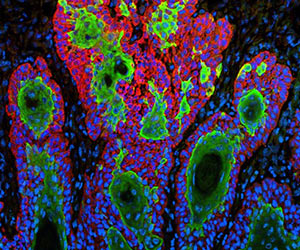Skin Carcinomas and Lymphomas Research
The goal of the section is to be the premier originator of new approaches to detect, prevent, and treat aggressive non-melanoma skin cancers (NMSC) and cutaneous lymphomas. This new section provides focus for interdisciplinary, collaborative research on high-risk non-melanoma skin cancers, bringing together multiple investigators at Moffitt, University of South Florida and beyond, bridging the entire spectrum from basic science to translational science to clinical trial. Whereas melanoma has over 25 FDA-approved therapies, the non-melanoma skin cancers and lymphomas have but a handful, highlighting vast differences in the fundamental molecular understanding of these diseases. The heart of the strength of this endeavor lies in the tremendous impact Moffitt Cancer Center has had the clinical management of NMSC. Furthermore, a historically strong collaboration with the USF Department of Dermatology has now been extended to a transplant dermatology clinic at Tampa General Hospital serving organ transplant recipients who are among the highest risk patients for cuSCC. Therefore, the opportunity to advance a section of the Skin Cancer Center of Excellence dedicated to non-melanoma skin cancers not only addresses major unmet medical needs, but does so in an ideal environment
Dr. Kenneth Y Tsai, MD, PhD was recruited from MD Anderson Cancer Center in 2016 to create this new section within the Skin Cancer Center of Excellence. He is a dermatologist, dermatopathologist, and scientist with a primary interest in high-risk cutaneous squamous cell carcinoma (cuSCC), Merkel cell carcinoma, and chemoprevention of skin cancer.
The Section has brought together several key collaborative groups pursuing translational science in cuSCC and Merkel cell carcinoma (MCC), streamlined tissue procurement from high-risk aggressive cuSCC and MCC across the country for molecular studies, supported the initiation of a new research working group in cutaneous T-cell lymphomas, and generated key preclinical data for clinical trials of a novel preventative and therapeutic approaches.
Working Groups
Repurposing Pramlintide for cuSCC Therapy
 We have recently identified a way by which the energy metabolism of cuSCC tumor cells may be reprogrammed, resulting in cell death and tumor shrinkage. Our preclinical data show that this approach, which involves repurposing an FDA-approved diabetes drug called pramlintide, is effective against cuSCC cells and cuSCC tumors in mice. We are currently developing an early phase clinical trial to test this in patients with aggressive cuSCC.
We have recently identified a way by which the energy metabolism of cuSCC tumor cells may be reprogrammed, resulting in cell death and tumor shrinkage. Our preclinical data show that this approach, which involves repurposing an FDA-approved diabetes drug called pramlintide, is effective against cuSCC cells and cuSCC tumors in mice. We are currently developing an early phase clinical trial to test this in patients with aggressive cuSCC.
Genomics of cuSCC Development
We recently reported a genomic analysis of early SCC development using RNA-seq and microRNA-seq in Nature Communications (PMID 27574101). This work is now being extended to the very highest risk groups of patients with cuSCC. The risk of developing cutaneous SCC is over 100 times higher in individuals who are immunosuppressed. Most often, these are patients who are organ transplant recipients. Though this level of risk is well established, its molecular basis is unknown and no therapy exists for advanced SCC in the immunosuppressed setting, since immunotherapy cannot be used in these patients for fear of causing transplant rejection.
Determinants of Merkel Cell Carcinoma Outcomes and Therapy Responses
Moffitt Cancer Center has a large, unique cohort of patients with this relatively rare tumor type, with detailed outcomes data and treatment results from immunotherapy. We are currently undertaking detailed genomic and proteomic analyses to determine what molecular changes are responsible for determining therapeutic success and for addressing resistance to immunotherapy.
Donald A. Adam Melanoma and Skin Cancer Center of Excellence
